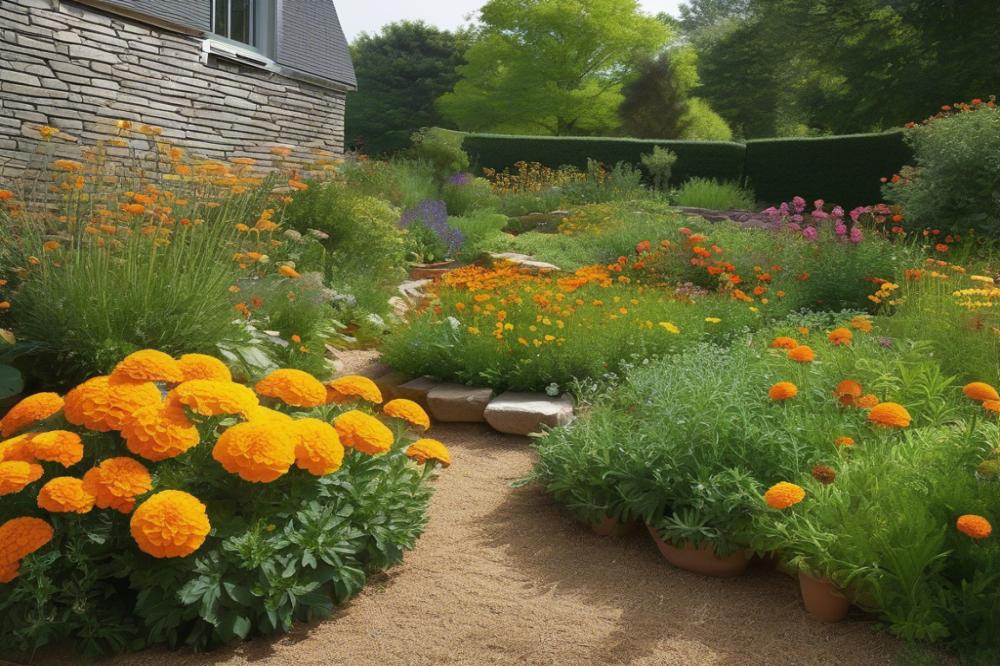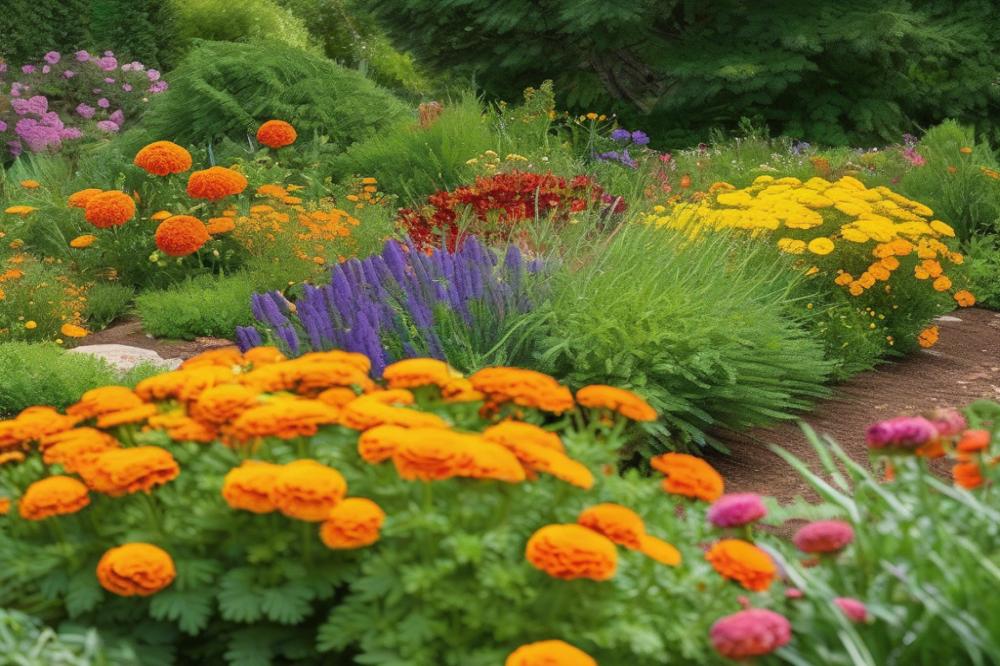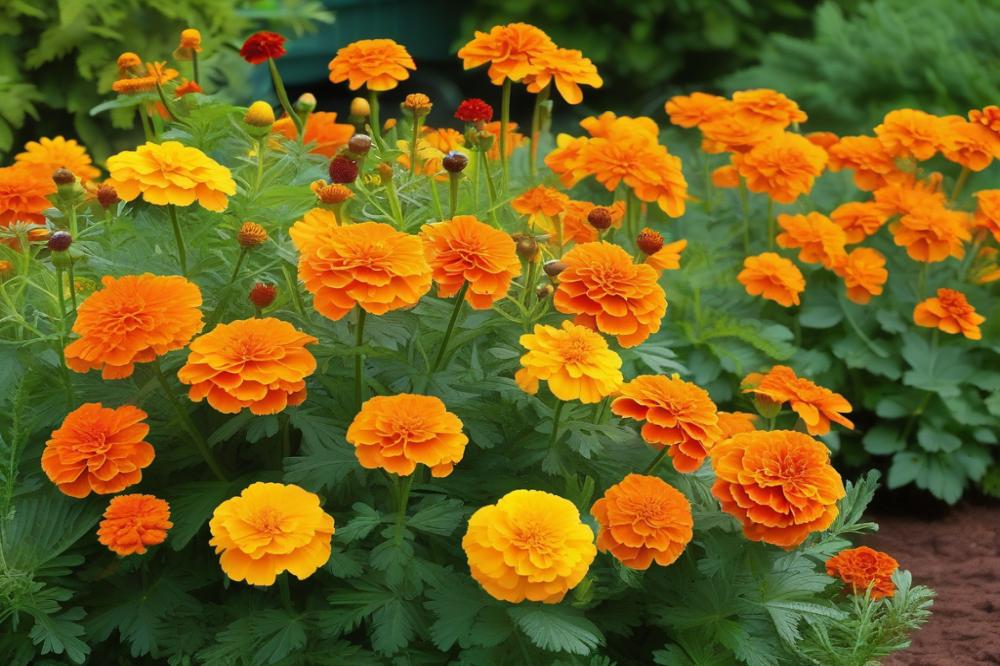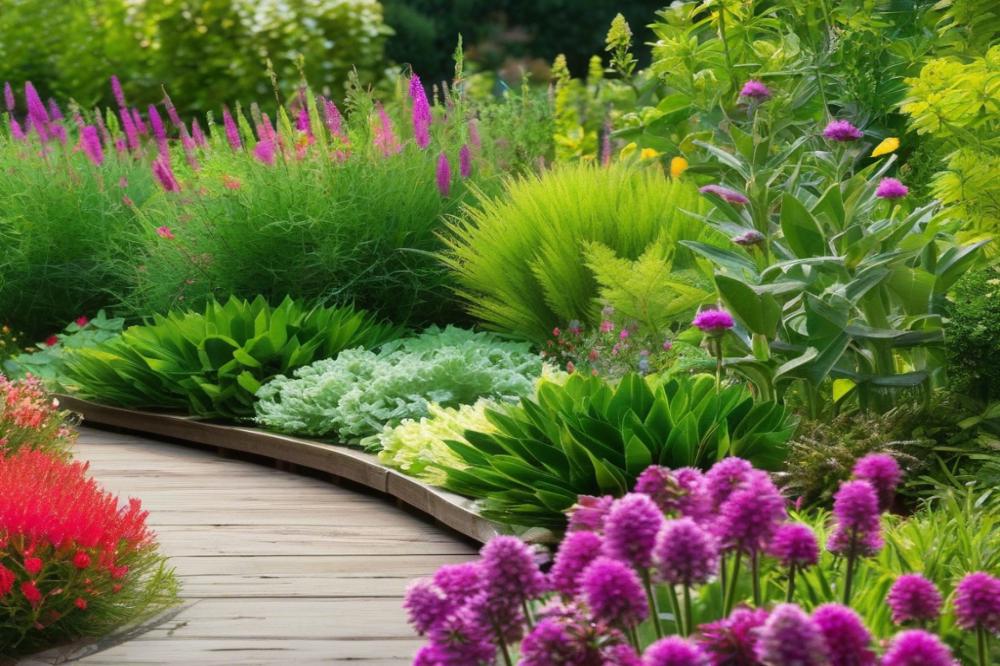The Role of Marigolds in Natural Pest Management
organic gardening methods have gained popularity among those who seek to grow their own food sustainably. The focus on using natural techniques, rather than chemicals, resonates with many. One essential aspect of organic gardening is the importance of Natural Pest Management. Gardeners want to protect their seedlings and crops without relying on synthetic pesticides.
Understanding pest control is vital for anyone looking to maintain a thriving garden. Garden pests can wreak havoc on plants. Some common problems include aphids, caterpillars, and leafhoppers. Traditional methods often involve toxic chemicals, which can harm beneficial insects and the environment. In response, many gardeners are exploring alternative techniques, including companion planting. This method involves growing plants together that can support each other, leading to healthier gardens.
In this pursuit of sustainable agriculture, certain flowers play a crucial role. For instance, the vibrant petals of Marigolds are more than just an eye-catching addition to any garden. They attract beneficial insects that help control pest populations. Furthermore, these flowers can deter harmful nematodes and other unwanted species from invading the soil. Their presence can provide an effective layer of crop protection.
Utilizing botanical insecticides can also contribute to effective natural pest management. These substances, derived from plants, offer a safer alternative to harsh chemicals. This approach aligns well with the principles of organic gardening. By employing a variety of techniques, gardeners can create an environment that supports plant health while minimizing pest issues.
Overall, maintaining a garden without chemical interference is both rewarding and essential. As more people embrace these methods, the importance of understanding plant interactions grows. Emphasizing flowers like marigolds can lead to healthier gardens and a balanced ecosystem. The journey towards a thriving garden lies in understanding and applying these natural principles effectively.
Marigolds: A Plant for pest control


Marigolds are vibrant flowers that add warmth to any garden. They come in various types, including Tagetes erecta and Tagetes patula. Some gardeners prefer the tall African marigold, while others choose the shorter French marigold. Each variety offers a stunning display and has its own charm.
Role in Repelling Garden Pests
This flower plays a significant role in pest control, making it a popular choice for organic gardening. Many gardeners plant marigolds alongside vegetables to create a natural defense. They have a reputation for repelling a range of garden pests, such as aphids and nematodes. The bright colors and strong scent deter these unwanted visitors. While they won’t eliminate every bug, their presence often reduces pest populations. Additionally, marigolds are known to attract beneficial insects that help in crop protection.
Mechanisms of Pest Deterrence
The pest deterrence mechanisms of marigolds are fascinating. These flowers release natural chemicals into the soil and air. These organic substances can act as botanical insecticides. Some pests find these chemicals unappealing, prompting them to stay away. The unique compounds in marigolds may disrupt the life cycles of certain harmful insects. This is especially true for nematodes, which can damage root systems. By planting marigolds, gardeners contribute to sustainable agriculture and promote a healthier ecosystem.
Companion planting with these flowers not only enhances beauty but encourages biodiversity. This approach helps create a balanced environment where both flowers and crops thrive. Beneficial insects, such as ladybugs and hoverflies, are often drawn to marigolds. In turn, these insects assist in managing pest populations naturally. The use of marigolds in the garden exemplifies a commitment to eco-friendly practices and effective pest management.
Companion Planting with Marigolds


Organic gardening thrives on the concept of companion planting. This method involves pairing plants that work well together to enhance each other’s growth while reducing pests. One major benefit is improved crop protection, which leads to a healthier garden. Using flowers in this way not only adds beauty but also supports the entire ecosystem of the garden.
Various studies suggest that these vibrant flowers can deter common garden pests. They release compounds that act as botanical insecticides. This natural defense mechanism creates an environment where harmful insects are less likely to invade. Additionally, certain marigold varieties can suppress nematodes, small worms that can damage the roots of other plants.
When considering companion planting, several plants pair well with these delightful blooms. For instance, tomatoes thrive when grown alongside marigolds. The flowers repel whiteflies and other harmful insects that target the tomato plant. Basil also enjoys the company of marigolds. Together, they not only enhance flavor but can improve health by encouraging beneficial insects to visit the garden.
Another excellent pairing includes peppers. Marigolds can help keep away aphids and other pests that are often drawn to these sweet fruits. When creating a diverse garden, incorporating such combinations can lead to greater success in pest control while promoting sustainable agriculture. All these elements tie back to the core principles of organic gardening, where each plant has an important role to play.
Targeting Specific Pests


Common garden pests affected by marigolds
Gardeners deal with a variety of pests that can damage plants. Common garden pests include aphids, whiteflies, and spider mites. These insects are not only annoying but also harmful to crops. Interestingly, certain flowers can help keep these pests at bay. Marigolds naturally repel some of these invaders. Their strong scent makes the garden less attractive to many troublesome insects.
Effectiveness against nematodes and other pests
One significant threat to garden health is nematodes. These tiny worms can infest the soil and harm plants’ roots. Some studies have shown that marigolds can suppress nematode populations effectively. Planting them alongside valuable crops acts as a natural method of pest control. Beyond nematodes, these flowers can deter a range of other garden pests, making them invaluable for crop protection.
Understanding the science behind marigold-based pest control
The effectiveness of marigolds lies in their ability to produce specific compounds. These compounds can act as botanical insecticides, keeping pests away. They also attract beneficial insects, such as ladybugs and lacewings. These allies help control unwanted pest populations even further. Companion planting with marigolds fits seamlessly into the ideas of organic gardening. This approach supports sustainable agriculture by minimizing the need for harmful chemicals. The role of flowers in this system cannot be overstated. They serve as both protection and an attractive element in gardens.
Attracting Beneficial Insects


Marigolds play an important role in attracting beneficial insects that help manage pests naturally. The bright colors and strong scent of these flowers draw in pollinators, such as bees and butterflies. Additionally, certain species of marigolds can lure predatory insects like ladybugs and lacewings. These predators actively hunt down harmful garden pests, contributing to effective pest control.
Beneficial insects are essential for sustainable agriculture. They provide natural crop protection by preying on pests that threaten plant health. Without the help of these insects, farmers and gardeners would rely heavily on chemical pesticides. Such reliance can disturb the balance in the ecosystem, harming not only pests but beneficial species as well. Organic gardening thrives when these natural allies are present to maintain a healthy garden.
A balanced ecosystem in the garden results from the interplay between various organisms. Companion planting harnesses the power of certain plants to attract or deter insects. When beneficial insects are present, they can help reduce the need for botanical insecticides. These natural alternatives are less harmful to the environment and human health. Marigolds contribute significantly to creating this balanced ecosystem that benefits all.
Moreover, by attracting insects that feed on nematodes, marigolds can help protect root systems from damage. This forms an integral part of pest management strategies. Gardeners who embrace these practices often find their gardens flourishing. Having a variety of flowers enhances biodiversity, which in turn supports a wider range of beneficial insects. Fostering this environment leads to healthier plants and more resilient gardens.
Using Marigolds in Organic Pest Management
Integrating Marigolds into an Organic Gardening Plan
Incorporating these colorful flowers into your organic gardening approach can be both creative and effective. They naturally enhance garden aesthetics while also providing organic pest control. When planted alongside vegetables and herbs, marigolds can deter unwanted visitors. This method, known as companion planting, supports a healthier ecosystem in your garden. The bright blooms attract beneficial insects, including pollinators, which are essential for increasing crop yields.
Marigolds as Botanical Insecticides and Plant Protectors
These flowers possess properties that make them more than just ornamental. They act as natural botanical insecticides. Their scent tends to repel specific pests like aphids and nematodes, which often threaten crop health. Additionally, marigolds can disrupt the life cycles of harmful insects. Certain compounds found in the flowers serve as a deterrent, cutting down on the need for synthetic pesticides. By creating an unfavorable environment for pests, they complement efforts in sustainable agriculture.
Practical Tips for Planting and Caring for Marigolds in Gardens
Choosing the right variety is a good first step. Some marigold types excel in the garden better than others. Opt for French marigolds for their pest-repelling abilities. When planting, position them near vegetables such as tomatoes or peppers. Growing these flowers in well-drained soil enhances their impact.
Regular watering promotes their growth, but avoid over-saturation. Deadheading, or removing spent flowers, encourages more blooms. By maintaining a vibrant color throughout the growing season, you facilitate ongoing pest control. These simple practices can significantly improve both your garden’s health and beauty. Over time, their presence can lead to a more balanced ecosystem, fostering beneficial insects and reducing reliance on chemical solutions.
Final Thoughts on Marigolds in Natural Pest Management
In summary, marigolds play a significant role in natural pest management strategies. These vibrant flowers not only brighten up gardens but also serve as a protective barrier against various pests. Their natural properties help repel harmful insects while attracting beneficial ones, creating an ecosystem where plants can thrive. By practicing companion planting, gardeners can maximize the benefits that marigolds provide to their crops.
Consider incorporating marigolds into your gardening practices. They are easy to grow and can be planted in various conditions. Their colorful blooms not only enhance the visual appeal of your garden but also contribute to healthier plants. Whether you are a novice or an experienced gardener, adding these flowers can transform your gardening experience.
Ultimately, the importance of sustainable pest control solutions cannot be overstated. As environmental awareness grows, more gardeners seek methods that reduce chemical use. Using natural remedies like marigolds offers a perfect balance between aesthetics and practical pest management. Embracing this approach fosters a healthier garden and a safer environment for all. Together, we can cultivate not only beautiful gardens but also a more sustainable future.



